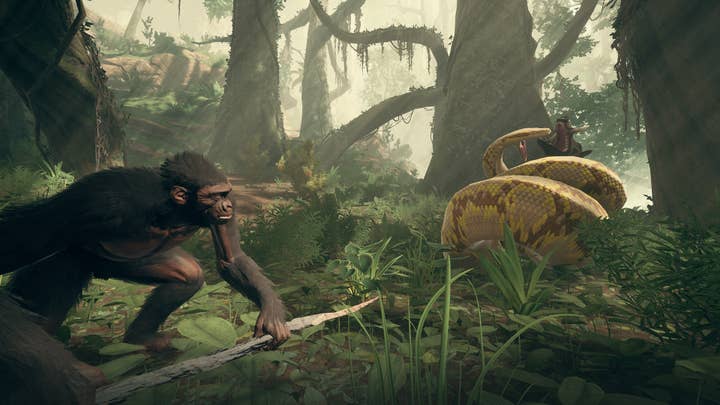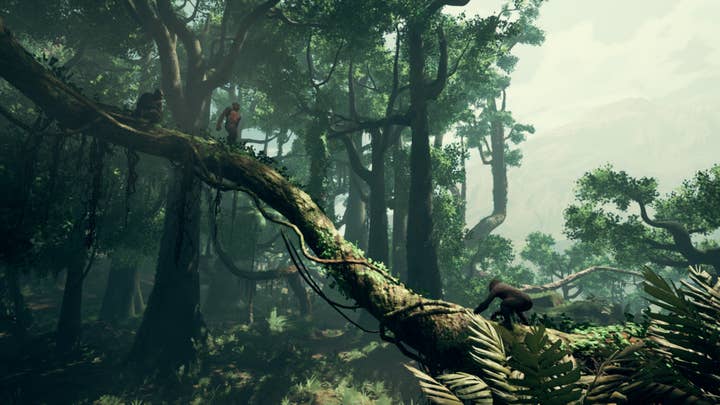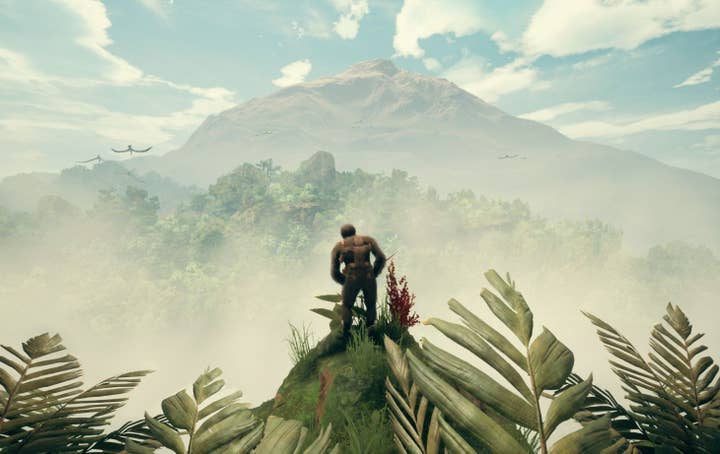Ancestors - The Humankind Odyssey: Critical Consensus
Patrice Désilets' Panache Digital leaves the critics intrigued and ultimately frustrated with a unique game that refuses to hold the player's hand
Patrice Désilets left Ubisoft almost ten years ago. One of the principal creators of Assassin's Creed, he was among the most recognisable and in-demand game designers in the industry -- and the industry eagerly awaited his next move.
If the possibilities were truly exciting then, reality quickly intervened. Désilets took the lead role at THQ's freshly minted Montreal studio in 2011, a time when THQ seemed to be re-emerging as an exciting publisher of bold new IP. In fact, it went bankrupt within 18 months, and Désilets found himself back at Ubisoft when his former employer swept in to pick up the pieces. Désilets was "terminated" by Ubisoft a few months later, and filed a lawsuit against the company to regain control of an in-development IP known only as "1666 Amsterdam."
Panache Digital was founded in late 2014, at which point Désilets had already spent more than four years in the wilderness, pursuing ideas and solutions that often came to nothing. Now, another five years on, Panache has launched a game that has left many critics feeling stuck in the wilderness, pursuing ideas and solutions that often come to nothing.
It is tempting to view Ancestors: The Humankind Odyssey as some kind of comment on the decade that has elapsed since the launch of Désilets' last game, Assassin's Creed II. However, the truth is that Panache Digital's debut release has ambition that travels well beyond the personal experiences of its figurehead. Désilets' name may have attracted Private Division to this truly unique game, but whether it survives in the marketplace will be down to the concept and its execution alone.
"Don't expect to watch numbers go up as you try new things; there are no scripted missions, and little guided feedback"
Polygon
And the concept is a doozy: a third-person, open-world survival game where you take control of a hominid living in Africa ten million years ago, and guide and evolve its clan over a vast expanse of time and myriad generations. The critics are united in their praise of this singular premise, and also stand as one in their utter confusion about Ancestors' refusal to guide or assist the player in navigating a path forward.
"There is no right way to play, which means there's no wrong way to play, which means that I have to find the motivation to continue and grow within my own ambition, not in the game's systems themselves," Polygon's Ben Kuchera wrote in his review.
"Don't expect to watch numbers go up as you try new things; there are no scripted missions, and little guided feedback, after the first few minutes of the game. I'm so used to being given some idea of what to do, and some reason to care about doing it, that the opening hours feel overwhelming and slightly uncomfortable.
"Trying to break down Ancestors' many systems would be a mighty task for a review, and to be honest, I don't understand enough of them to try, even with about ten hours' worth of play under my belt. The strongest motivation I found to try new things was boredom -- and I mean that in a flattering way. I could stay near my clan, and eat and drink and sleep as a contented hominid for as long as I'd like, but why would you play any kind of game if you didn't want to go on an adventure?"

In an era of games like Dark Souls and Sekiro: Shadows Die Twice, this refusal to hold the player's hand would seem to meet a demand within the audience -- Ancestors' opening text even reads "good luck, we won't help you much." However, while that approach may be admirable conceptually, in practice it needs to be carefully balanced to be rewarding. For many critics, Panache doesn't quite get that balance right.
"After eating everything I could get my hands on, picking up everything that wasn't nailed down and having a nap, I unlocked some dexterity and communication skills that let me call for help, ask my clanmates to mimic my actions and gave me the ability to switch items between my hands," VG247's Lauren Aitken wrote in a largely frustrated review. "This led to the discovery of tool making, and my army of apes soon began to equip themselves with pointy sticks. It's a long-winded process, but not without a feeling of progression even if the rewards often seem slight.
"This laborious system kills the flow of the game, making your slog through the jungle just that; a real slog through the jungle"
VG247
"But after leaving the safety of my settlement in an attempt to find another, I was stopping and starting every ten seconds or so to stand up, have a look and sniff around to identify objects and memorise them, only to forget them almost immediately. This laborious system kills the flow of the game, making your slog through the jungle just that; a real slog through the jungle."
For PC Gamer, which gave Ancestors 58%, that repetition is exacerbated by a lack of finesse in key systems. Most in-game days are occupied by a familiar loop of exploration and detection, in the hope of finding some new understanding. However, many aspects of Panache Digital's game are "awkward," which undermines how satisfying that cycle really ought to be.
"When I want to use my senses to investigate something, I need to stop moving completely," PC Gamer's Christopher Livingstone wrote. "Then I need to make sure I'm not close to any rock, stick, plant, or food item or I'll get the prompt to interact with that item instead of the prompts to use my senses. So there's a lot of moving and stopping, then shuffling around because I stopped too close to something else. It's awkward instead of instinctive, which isn't great for a game about being a creature of instinct.
"There's naturally lots of climbing and jumping around on the cliffs and trees, which can be exhilarating when making long leaps to snag vines and branches, but much less fun when you miss. There's no targeting here -- it's a leap of faith that you'll connect with the spot you're aiming for, and most expeditions wind up with me plummeting to the ground at least once and shattering my leg.
"The finer movements of my hominid are even more difficult, like trying to transition from a vertical tree trunk to a horizontal branch, which takes a lot of slow maneuvering, re-adjusting, and accidentally climbing up when I mean to climb down."

Exploration is perhaps where Ancestors is at its strongest. With its seven out of ten review, IGN is arguably the biggest site with the most positive things to say about this unusual game, and traversing Ancestors' pretty but largely unmarked jungle is chief among them.
"The routes between the discoverable landmark areas are rarely a straight line," IGN's Dan Stapleton wrote. "Getting across a rushing river or a steep cliff takes some effort, and it all feels well thought out. Discovering points of interest is one of the best ways to gain experience, and in order to do that you have to get your apes to move outside their comfort zones and face the fear of the unknown... so there's a lot of incentive to stay on the move.
"I can't remember the last time I've been so interested to see the wider reaction to a piece of work"
Waypoint
"Before you figure out how simple it is to craft a stick to defend yourself, it often makes a lot of sense to stay off the ground as [much as] possible, since predators are almost exclusively on the forest floor... Swinging from tree to tree is a thrill, except the fact that we're doing this from a third-person perspective and flying through leaves means that you can't really see what's coming. When the branches run out unexpectedly you get to go down in history as the one who invented the concept of the face plant."
Ultimately, very few of Ancestors (admittedly brave) creative choices are free from caveats. Very few critics failed to praise Panache for taking on such an ambitious idea, or for giving the player so much freedom and responsibility in establishing and accomplishing their goals. But just as few seem convinced that this is the best possible experience that could arise from that idea and those values.
"[Ancestors] possesses a mood and an ethos that, depending on the player, is equally likely to delight and infuriate," Waypoint's Patrick Klepek wrote in his review. "I experienced so few moments of the former and so many more of the latter. I've played and written about thousands of games during my 20-plus years as a journalist, and I can't remember the last time I've been so interested to see the wider reaction to a piece of work; it will be impossible to play Ancestors and not come away with an opinion on what it's trying."
Indeed, Klepek is one of a handful of critics to point to a future where online communities and a well stocked Wiki could be the key to making it a more satisfying experience. Classic titles like Minecraft and Stardew Valley were largely inscrutable until the intervention of dedicated players, and that could be the same here. While it is ostensibly an offline single-player experience, Ancestors may actually need to be out in the wild before it comes into its own.
"You'll be able to read message board threads with people sharing hints and discoveries, or sit around with a group of friends and pass the controller, as someone decides to test a hypothesis," Klepek wrote. "I didn't have that. It might go against the spirit of the game, but it's also going to prove a necessary relief valve. And maybe it's not against the spirit of the game at all! Maybe it reflects how different tribes would exchange information, helping the species as a whole.
"It's also the only way I can picture myself playing more of this game"

